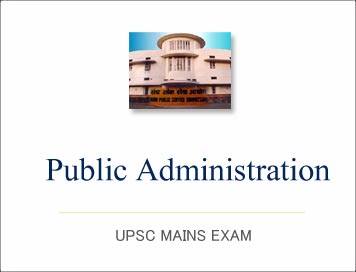(Online Course) Pub Ad for IAS Mains: Financial Management: Accounting Techniques (Paper -2)

(Online Course) Public Administration for IAS Mains Exams
Topic: Financial Management: Accounting Techniques
Ground rules of accounting that are (or should be) followed in preparation of all accounts and financial statements.
The four fundamental concepts are:
(1) Accruals concept: revenue and expenses are taken account when they occur and not when the cash is received or paid out;
(2) Consistency concept: once an entity has chosen an accounting method, it should continue to use the same method, except for a sound son to do otherwise. Any change in the accounting method must be disclosed;
(3) Going concern: it assumed that the business entity for which accounts are being prepared is solvent and viable, and will continue to be in business in the foreseeable future;
(4) Prudence concept: revenue and profits are included in the balance sheet only when they are realized (or there is reasonable ‘certainty’ of realizing them) but liabilities are included when there is a reasonable ‘possibility’ of incurring them. Also called conservation concept.
(5) Accounting equation: total assets of an entity equal total liabilities plus owners’ equity;
(6) Accounting period: financial records pertaining only to a specific period are to be considered in preparing accounts for that period;
(7) Cost basis: asset value recorded in the account books should be the actual cost paid, find not the asset’s current market value;
(8) Entity: accounting records reflect the financial activities of a specific business or organization, and not of its owners or employees;
(9) Full disclosure: financial statements and their notes (footnotes) should contain pertinent data;
(10) Lower of cost or market value: Inventory is valued either at cost or the market value (whichever is lower) to reflect the effects of obsolescence;
(11) Maintenance of capital: profit can be realized only after capital of the firm has been restored to its original level, or is maintained at a predetermined level;
(12) Matching: transactions affecting both revenues and expenses should be recognized in the same accounting period;
(13) Materiality: relatively minor events may be ignored, but the major ones should be fully disclosed;
(14) Money measurement: accounting process records only those activities that can be expressed in monetary terms (with some exceptions, as in cost-accounting);
(15) Monetary measurement: only the activities measurable in terms of money should be recorded;
(16) Objectivity: financial statements should be based only on verifiable evidence, comprising an audit trail;
17) Realization: any change in the market value of an asset or liability is not recognized as a prom or loss until the asset is sold or the liability is paid off (discharged);
(18) Unit of measurement: financial data should be recorded with a common unit of measure (dollar, pound sterling, etc.)
